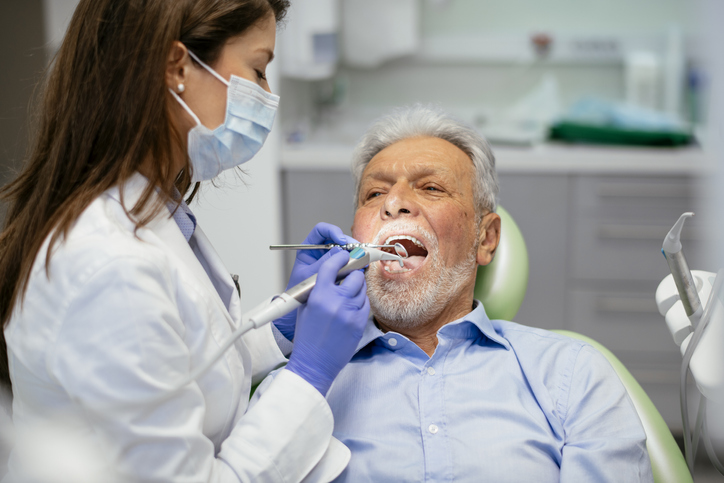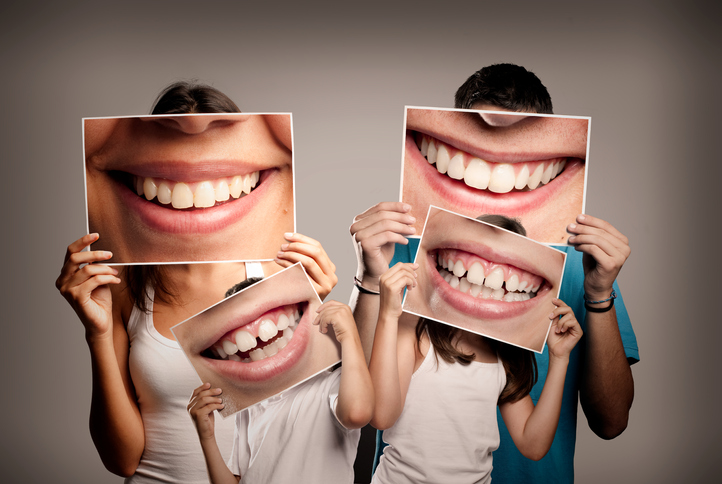-
6 Solutions for Sensitive Teeth

Do you find yourself turning down hot chocolate or ice cream because you know they will make your teeth hurt? Even sweet or sour food and cold air can bother extra sensitive teeth. Once you understand the cause, you can begin treating those unpleasant tooth twinges.
What Causes Sensitive Teeth?
Your teeth might be bothering you if you have any of the following:
- Worn enamel: If this hard outer layer wears away, nerve endings in the dentin become exposed, causing the pain associated with sensitive teeth.
- Receding gums: Enamel doesn’t extend below the gum line. If your gums recede, the dentin here is left unprotected. This could cause pain when you eat or drink things like hot soup or ice-cold water.
- Cracked tooth: If the crack extends down to the root, you will experience pain when your tooth gets cold.
Preventing Sensitive Teeth
If you hope to avoid painful, sensitive teeth, you must protect your enamel and gums. Here’s how:
- Brush gently: Use a soft-bristled toothbrush and be careful not to brush too hard. Your goal might be to remove food particles and stains as effectively as possible, but hard brushing can damage your enamel and irritate your gums.
- Avoid acidic food and drinks: A diet high in acid and sugar leads to sensitive teeth and cavities. Snack on fruits, vegetables, and dairy products to strengthen your enamel.
- Avoid certain types of mouthwash: If your teeth hurt when you rinse with mouthwash, acids could be irritating your exposed dentin. Look into using a neutral fluoride mouthwash for the best results.
Treatments for Sensitive Teeth
If your enamel is damaged and your gums are receding, it might be too late to prevent tooth sensitivity. Luckily, there are ways to treat and reverse this condition. Here are six solutions for sensitive teeth:
- Desensitizing toothpaste: Your dentist may recommend a particular brand, or you can try out a few on your own to narrow down what works best for you.
- Fluoride gel: This product soothes gums, strengthens teeth, fights cavities, and helps reduce tooth sensitivity.
- Sealants: Dental sealants placed over the exposed root surface can be an effective solution for sensitive teeth.
- Fillings over exposed roots: By covering sensitive dentin located below the gum line, the area becomes desensitized and no longer hurts when exposed to hot and cold temperatures.
- Surgical gum grafts: This is another option for protecting a sensitive tooth root. If there is no decay, a gum graft may be sufficient. Otherwise, both a filling and a gum graft may be required.
- Mouthguard: If you grind your teeth when you sleep, a mouthguard may benefit you. This prevents tooth enamel from wearing away, making other treatments for sensitive teeth more effective.
If you suffer from sensitive teeth, contact Glenwood Premier Dental at (732) 264-4477 to speak with our Hazlet dentist about your concerns. We can recommend treatments and deliver the restorative dentistry you need to eliminate tooth sensitivity.
-
Coping with Oral and Dental Health Changes As You Age

Good oral care should begin when you’re young and continue for a lifetime. If you’re struggling to maintain a beautiful smile as you age, you’re not alone. Consider the oral and dental health challenges that older adults face, along with helpful tips for keeping your smile healthy.
Age-Related Dental Problems
Your body and health changes when you get older, which makes you more prone to the following conditions:
- Cavities: Your cavity risk increases with age because dry mouth can cause cavities, and dry mouth is a common side effect of medications prescribed to treat age-related ailments. Before you start taking a new medication, ask your doctor if it causes dry mouth.
- Receding gums: Failing to brush and floss every day may cause your gums to recede as you get older.
- Aesthetic changes: Over the years, gravity causes overcrowding of the dental arches. Teeth shift and overlap, making them more difficult to clean. Pits, cracks, and chips caused by years of wear and tear also alter the appearance of your smile.
- Oral cancer: Tobacco and alcohol use can increase the risk of cancer in the mouth and throat. Years of partaking in these unhealthy habits may catch up to you when you get older.
How to Maintain a Healthy Smile as You Age
Getting older doesn’t mean you have to lose your teeth. Avoid tooth and gum problems with these tips:
- Brush and floss: Brush with fluoride toothpaste and a soft-bristled brush twice a day, and floss once a day. If you have arthritis, an electric toothbrush could be a more comfortable option. Floss picks, interdental brushes, and water flossers are also good alternatives to traditional floss.
- Clean your dentures: If you wear full or partial dentures, remove and clean them every night.
- Eat well: Sugar causes cavities no matter your age. Avoid sweets and eat more fruits and vegetables to minimize tooth decay and oral cancer risk.
- Check your mouth for anything unusual: If you see white splotches, lesions, or other concerns, have them checked out. It’s probably nothing, but if it’s oral cancer, catching it early is vital for treatment to be effective.
- Monitor your overall health: The body and the mouth are intricately connected. Keep an eye on all aspects of your health to keep your mouth and body healthy.
- Quit smoking and drinking: Strive to give up bad habits like drinking, smoking, and chewing tobacco to preserve healthy teeth and gums.
- Visit the dentist: A routine cleaning two to four times a year can do wonders for your smile as you age. It’s also an opportunity to find and correct problems early to avoid losing your teeth.
You’re never too old to have a beautiful, healthy smile! If you’re concerned about your teeth and gums as you get older, contact Glenwood Premier Dental at (732) 264-4477 to schedule an appointment. We offer the restorative treatments you need to get your smile back on track.
-
How to Find a Good Dentist

If you recently moved to Hazlet, New Jersey, or your insurance coverage has changed, you may be on the lookout for a new dental provider. It’s vital to work with a dentist who can meet your needs in every way. Here are the top tips for finding a good dentist in Hazlet.
- Choose a dental provider you can trust. Otherwise, you could be diagnosed with conditions you don’t really have and end up paying for treatment you don’t really need! It can be hard to tell if your dentist is giving you accurate information. If you receive a diagnosis that doesn’t seem right, ask for clarification and proof. Consider getting a second opinion before you undergo major treatment.
- Look for a membership with the American Dental Association. This helps with the credibility factor. Members of the ADA must promise to involve the patient in the decision-making process, provide the highest level of care, and be as truthful and honest as possible with every patient.
- Demand digital x-rays. This technology is more advanced than older x-ray techniques. It protects you from radiation exposure, and the images are available immediately. Make sure your dentist offers this among other cutting-edge office technology.
- Ask friends and family for recommendations. Other people’s experiences can tell you a lot about one dental provider or another. If you don’t know anyone in your new area yet, online reviews are the next best thing.
- Consider location and hours. You want dentist visits to be convenient, so consider finding a practice that’s close to home, work, or your children’s school. Make sure the office hours work for your schedule as well.
- Notice how you’re treated. Your first interaction with a new dentist tells you a lot about them. Are they patient and respectful of your questions? Do they provide you with a thorough examination and x-rays to establish your health record? If your appointment feels rushed or incomplete, consider going elsewhere.
- Ask for a translator. If English isn’t your native language, it can be incredibly helpful to have someone translate. The medical jargon used in the dental field can be confusing and technical, so having a translator available ensures you don’t miss anything.
Glenwood Premier Dental in Hazlet, NJ can meet all your dentistry needs. From routine cleanings and emergency care to restorative treatments and Invisalign, we have you covered! We strive to provide the ultimate patient experience, with dentists who are ADA members and bi-lingual in English and Spanish. Our office is outfitted with the latest in dental technology, and you’ll always feel informed about your health and treatment costs before a procedure begins. We offer new patient specials and free second opinions to make your transition to our office as streamlined as possible.
Give us a call at (732) 264-4477 today to ask questions and schedule your first appointment. We look forward to meeting you!
-
Dental Hygiene Tips

How do you prevent the billions of bacteria in your mouth from causing cavities and gingivitis? Keep your mouth healthy with a few simple dental hygiene tips.
Brushing
Brushing your teeth is the foundation of good oral health. Keep these best practices in mind:
- Brush twice a day—once in the morning and again before bed—using fluoride toothpaste and a small-headed, soft-bristled toothbrush.
- Brush for two minutes. Spend 30 seconds in each quadrant of your mouth.
- Hold your toothbrush at a 45-degree angle along the gum line. Use short, gentle, back-and-forth motions to scrub your teeth without irritating your gums.
- Brush every side of each tooth, including the front, back, and biting surface.
- Clean your tongue to get rid of bacteria that can cause bad breath.
- Rinse your toothbrush thoroughly after each use. Store your toothbrush upright without a cover to encourage a quick dry time.
- Wait at least 30 minutes after eating to brush your teeth.
- Replace your toothbrush every three months.
Flossing
Even the most thorough brushing leaves bacteria in the tight spaces between each tooth and under the gum line. That’s why it’s necessary to floss once a day. Follow these tips for the best results:
- Use a generous, 18-inch piece of floss to prevent it from slipping out of your grip.
- Readjust the position of the floss on your fingers as you go to use fresh floss between each tooth.
- Avoid snapping the floss against your gums. Use an up-and-down motion rather than a sawing motion to avoid hurting the soft tissue.
- Get between every tooth and behind your rear molars.
- If you find it difficult to floss, try a non-traditional option, such as a floss pick, interdental brush, or water flosser.
Mouthwash
Consider that your teeth make up less than half of the surfaces in your mouth. Rinsing cleans your mouth by removing biofilm and bacteria that brushing and flossing leave behind. Just remember these tips:
- Mouth rinse isn’t a substitute for brushing and flossing. However, it can supplement your other dental hygiene efforts to reduce the chance of cavities and infections.
- Select a mouth rinse with antimicrobial properties to reduce bacteria and plaque activity.
- Look for fluoride on the ingredient label to protect your teeth from decay.
- Consider a whitening peroxide rinse to fight tooth discoloration and staining.
Bonus Dental Hygiene Tips
In addition to your formal dental hygiene routine, incorporate these tips into your everyday life:
- Drink more water and less sweetened drinks, including juice and soda.
- Avoid sweet and acidic foods that erode tooth enamel.
- Chew sugarless gum after meals to stimulate saliva flow, wash away food particles, and neutralize the pH in your mouth.
For more dental hygiene tips, or to ask questions about your oral health, please contact Glenwood Premier Dental at (732) 264-4477. Our dentist in Hazlet can answer your questions and provide expert dental care.
-
3 Reasons Good Dental Hygiene Is So Important

You hear it all the time: good dental hygiene is crucial. What you might not know, though, is why it’s so important. Here, we offer three compelling reasons to take good care of your teeth.
- Good dental hygiene helps keep your teeth healthy. This one may seem obvious, but it’s an important fact. Whether or not you get cavities is partially dependent on your genetics, but when you brush, floss, and rinse daily, you’re doing your part to keep your teeth and gums healthy. Brush your teeth twice a day and floss and rinse at least once, to remove plaque, prevent tooth decay, and stimulate your gums.
- Regular dental visits can provide disease detection. When you go every six months, your dentist can discover issues that affect more than just your mouth. With a thorough examination, many problems and diseases can be detected, including vitamin deficiencies, acid reflux, tooth grinding, diabetes, osteoporosis, heart trouble, dementia, oral cancers, and even mental health issues.
- When you care for your mouth, you prevent disease in your whole body. When your mouth is infected, that infection can spread and lead to bigger health concerns than cavities. For instance, gingivitis, a common inflammation of the gums, can turn into periodontitis, which can cause tooth loss. Infections that spread from your mouth have been linked to issues like asthma, arthritis, premature birth and low-birthweight babies, respiratory ailments, coronary artery disease, and stroke. Left untreated, tooth and gum disease can even be fatal.
So what do you need to do to reap all of the benefits of good dental hygiene? Start by eating a nutrient-dense diet and avoiding snacks full of sugar and processed carbohydrates. Don’t smoke or use any other tobacco products. Rinse your mouth out after each meal, or chew sugarless gum. Brush your teeth for two minutes, twice a day, using a medium-bristled brush, fluoride toothpaste, and small, circular, back and forth motions. Floss at least once a day, and rinse with an anti-microbial fluoride mouthwash. Finally but perhaps most important of all, see your dentist every six months for a cleaning and exam.
If you’re looking for a dentist in Hazlet, New Jersey, you can trust Glenwood Premier Dental to meet your needs. At Glenwood Premier Dental, we believe that a healthy, confident smile is an important part of a happy and healthy lifestyle. Our staff of caring professionals is committed to offering a wide range of dental services, exceeding our patients’ expectations, and providing the best possible service. We offer dental exams and teeth cleanings, implant dentistry, Invisalign, laser dentistry, teeth whitening, veneers, and more, using state of the art technology in a comfortable and friendly environment. If you’re looking for dental care in Hazlet, contact us through our website or call 732.264.4477 for more information.
